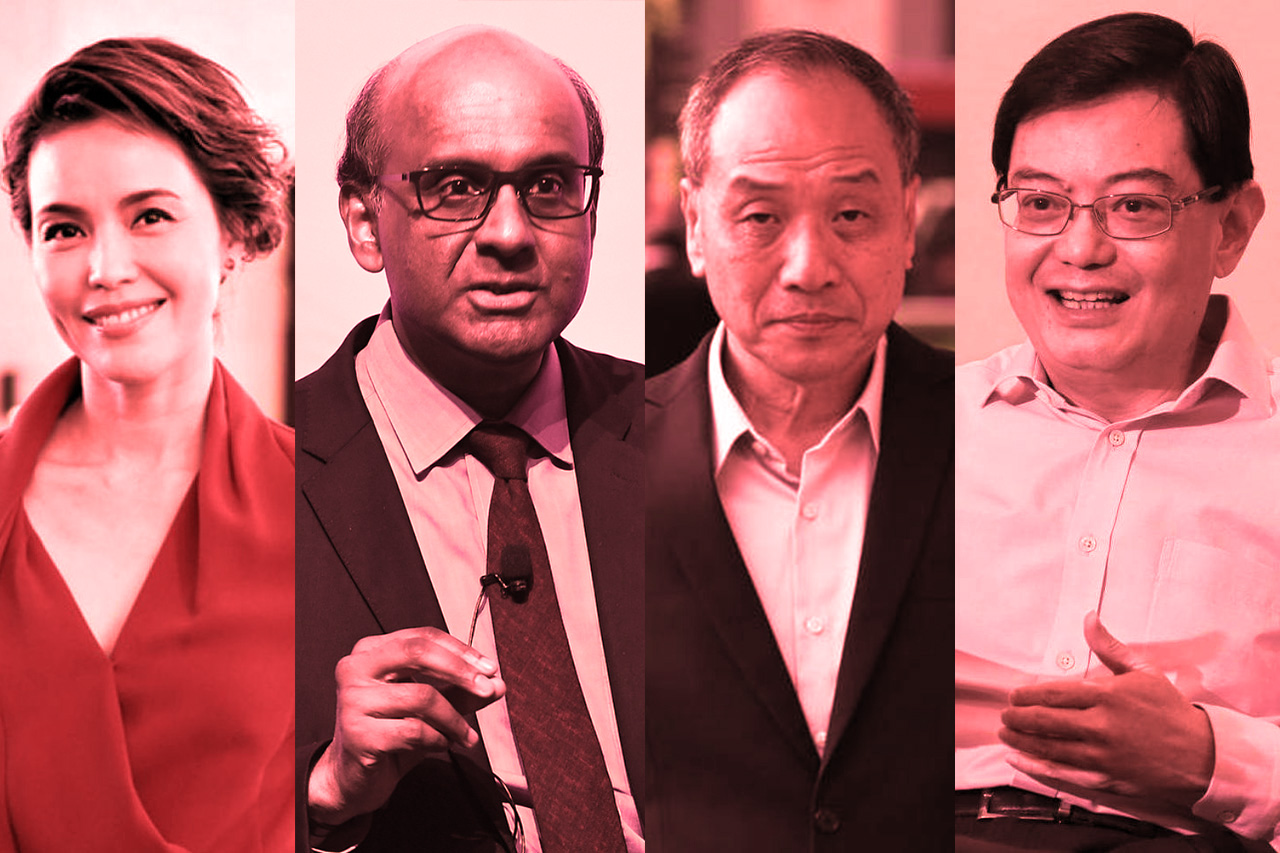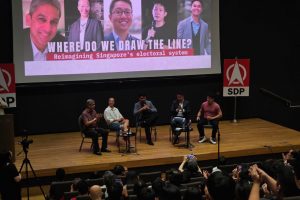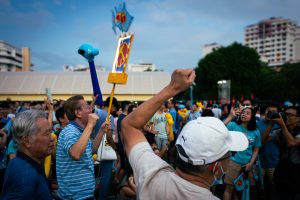When a Singaporean pictures the perfect politician, who comes to mind?
Lee Kuan Yew? Tharman Shanmugaratnam?
… Zoe Tay?
We often believe that the choices we make at the ballot box are the best possible ones. And we’re not entirely wrong in thinking so.
However, what we do not realise is that too often the choices we make are swayed by subconscious biases. So much of what we call “credibility” is merely the affirmation of our own preferences for specific behavioural traits with what we are familiar and comfortable with.
Take Tharman for instance. His gentle yet firm tone, his bespectacled kindly face, and his bald head filled with wisdom—these are all hugely appealing to most Singaporeans.
It helps that he even reminds us of our own grandfathers.
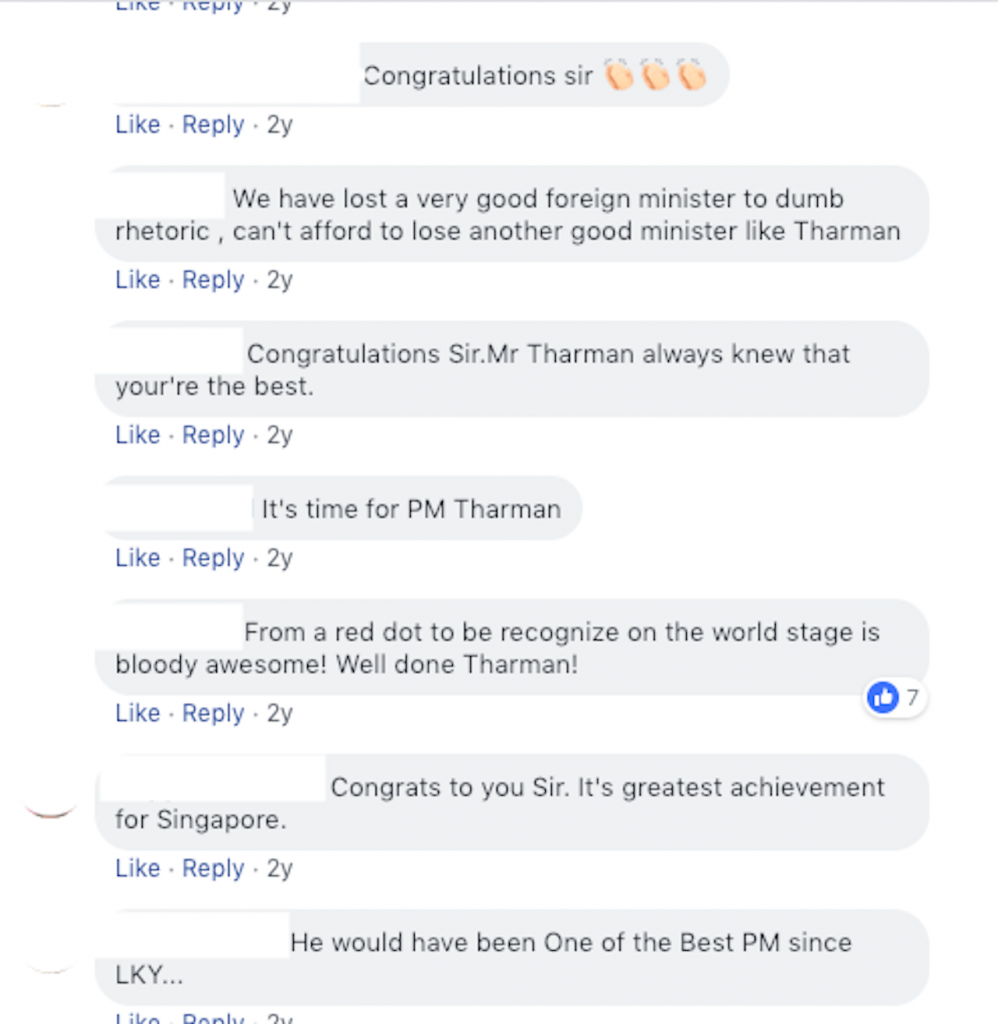
However, these are preferences that often hinge upon perceived relatability and likability, rather than concrete measurements of successful leadership—something we previously explored in an article about Minister Chan Chun Sing.
Working with Milieu Insight, a local independent research company, we surveyed Singaporeans on their favourite/preferred public figures. The questions were tailored to reveal the different patterns of likability, specifically between millennials and baby boomers, and graduates and non-graduates.
Accordingly, the overall results have been weighted to reflect Singapore’s online population by their age and education levels. Percentage results presented in the infographics are only amongst Singaporeans who have indicated that they are aware of public figures we have used in the survey.
The following 4 questions were posed:
- Which of these Singapore public personalities do you trust?
- Which of these Singapore public personalities would you want go for dinner with?
- Which of these Singapore public personalities do you think would understand your problems?
- Which of these Singapore public personalities would you want as your boss?
In all 4 questions asked, Tharman edged out the competition and emerged at the top, or at least amongst the top few favourites indicated by the surveyors.
Behind his immense popularity are those with access to higher tiers of education, and the younger generation (millennials). When asked, “Which of these Singapore public personalities do you trust?”, 45% of millennials between 24 and 28 voted for Tharman, while only 39% of baby boomers (aged 54 and above) did so.
In comparison, 39% of baby boomers voted for Heng Swee Keat, while only 29% of millennials did so.
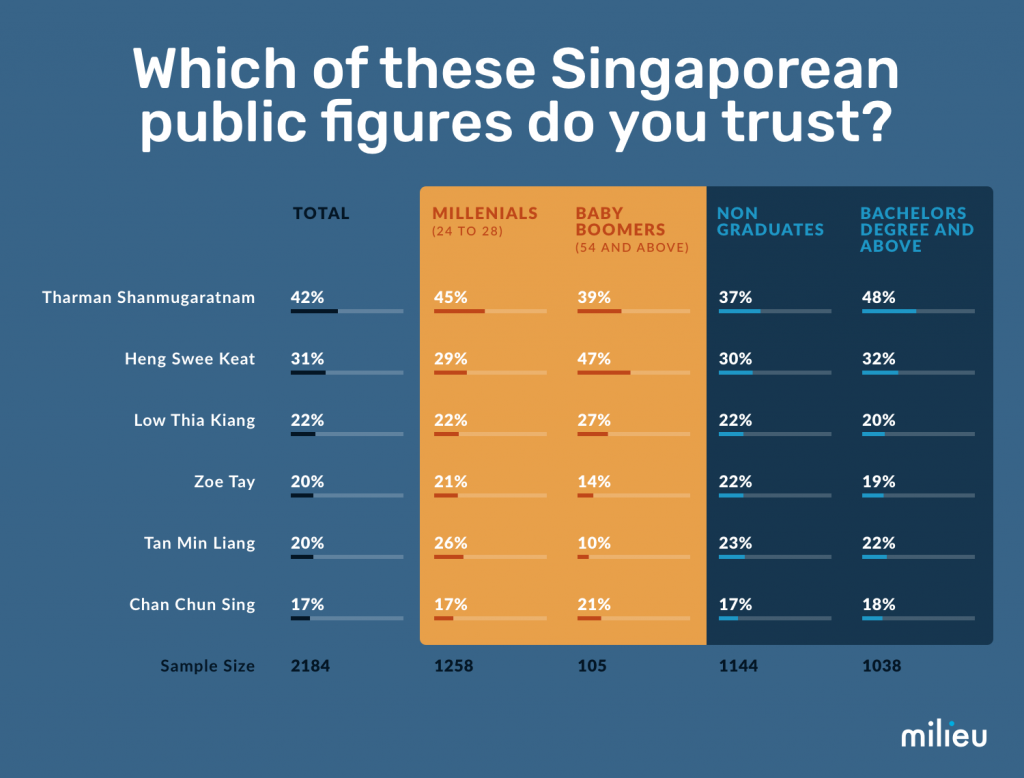
Tharman’s near-perfection articulation and neutral accent undoubtedly appeal to middle and upper-middle class, tertiary-educated Singaporeans. His sharp intellect has been well established in live interviews with regional and global broadcasting stations such as Channel NewsAsia and Bloomberg, during which he has been seen delivering his thoughts and ideas seamlessly, taking on challenging questions with wit and scholarly decorum.
He seems to have it all, on top of an impeccable track record of leadership positions in and out of parliament. In essence, he embodies all the qualities that our tertiary education system has strived to inculcate in young Singaporeans.
Millennials love Tharman. Yet how many within this demographic know how exactly Tharman has contributed to Singapore’s progress as a nation?
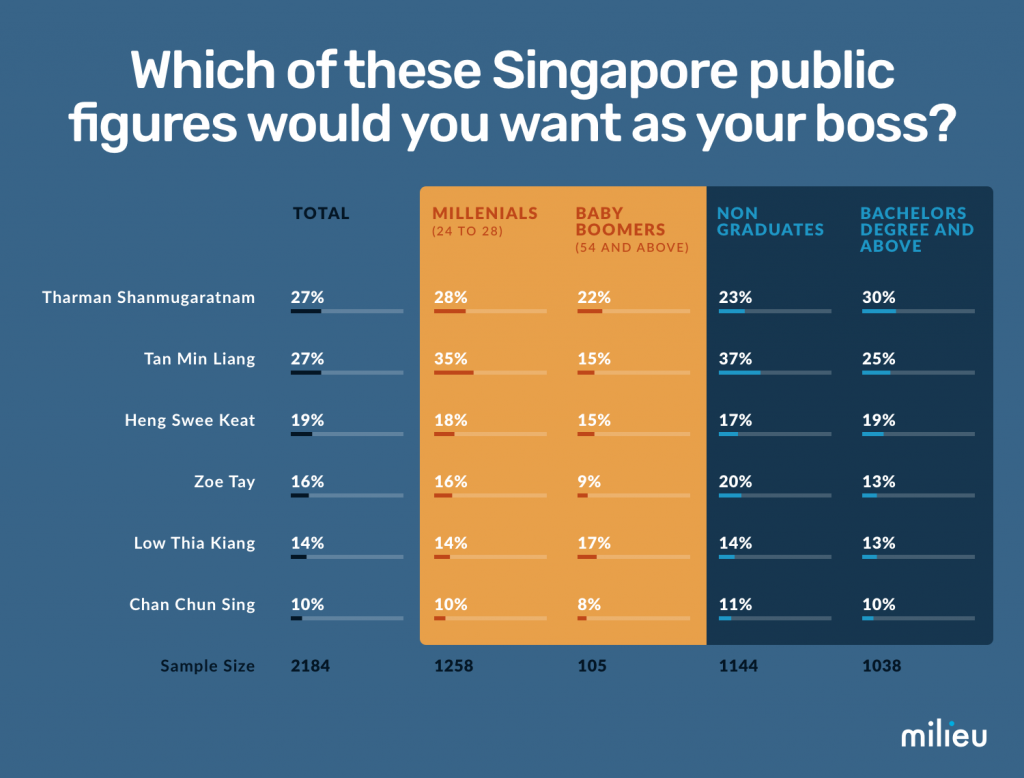
In contrast, Low Thia Khiang placed 2nd after Tharman amongst the baby boomers, with 17% indicating they would want him as their boss.
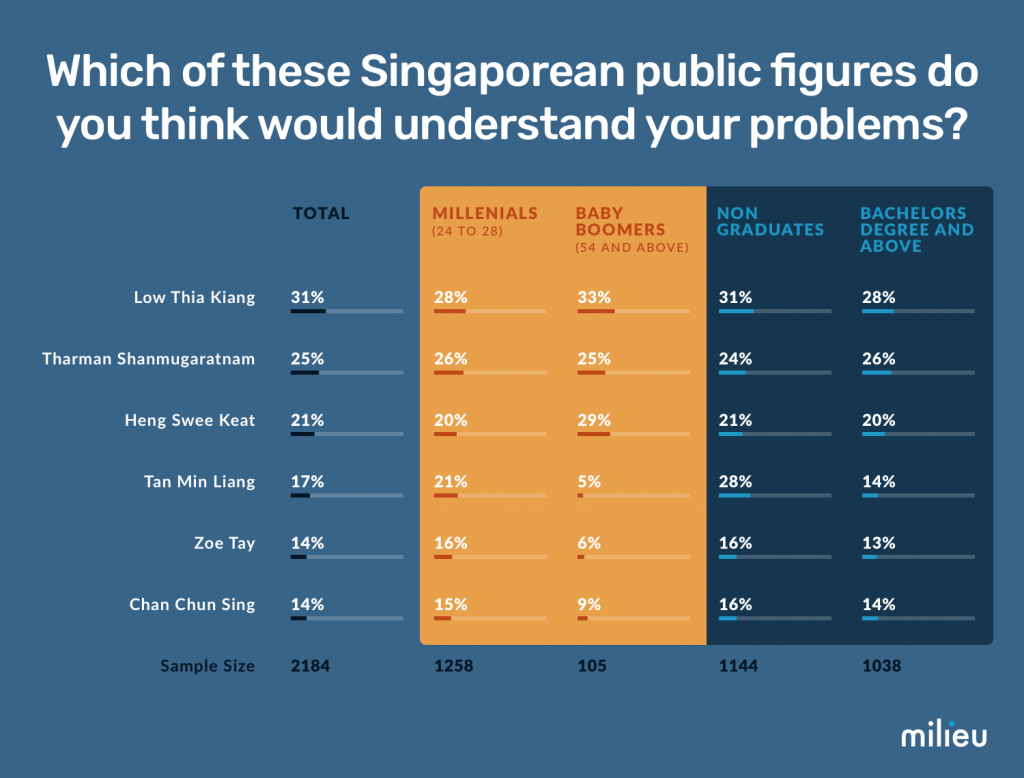
Regardless of their political leanings, the majority of respondents picked Mr Low. While 33% of Baby Boomers voted for him, only 28% of Millennials did so too.
On the whole, 31% of respondents indicated that Mr Low would be able to understand their problems, with Tharman trailing at 25%, and Minister Heng at 21%.
Why?
We suspect that unlike many of his peers in Singapore’s political landscape, Mr Low is Chinese educated and strings his sentences together with blatant disregard for any syntactic formalities. For instance, he had famously said of the ruling party in parliament, “Their political opponents and critics, sue until pants drop”.
He isn’t the most linguistically competent orator, but Mr Low boasts his own brand of eloquence, knows what works for him, and owns it.
Unsurprisingly, Singaporeans relate to this humble, unfiltered disposition.
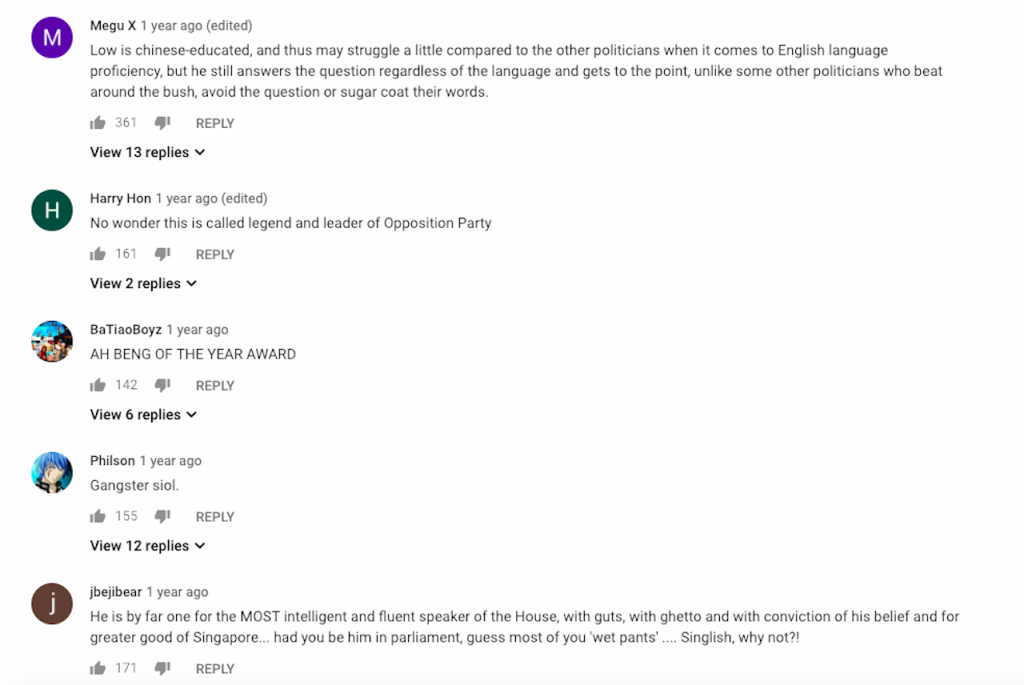
In contrast, our Millennials have gone about their entire lives mostly thinking and communicating in English.
Naturally, the former would find Low Thia Kiang’s persona more relatable. He’s a “man of the streets” and an average Singaporean, just like them. Our Cambridge-educated MPs such as Tharman and Lee Hsien Loong feel distant and unfamiliar in comparison.
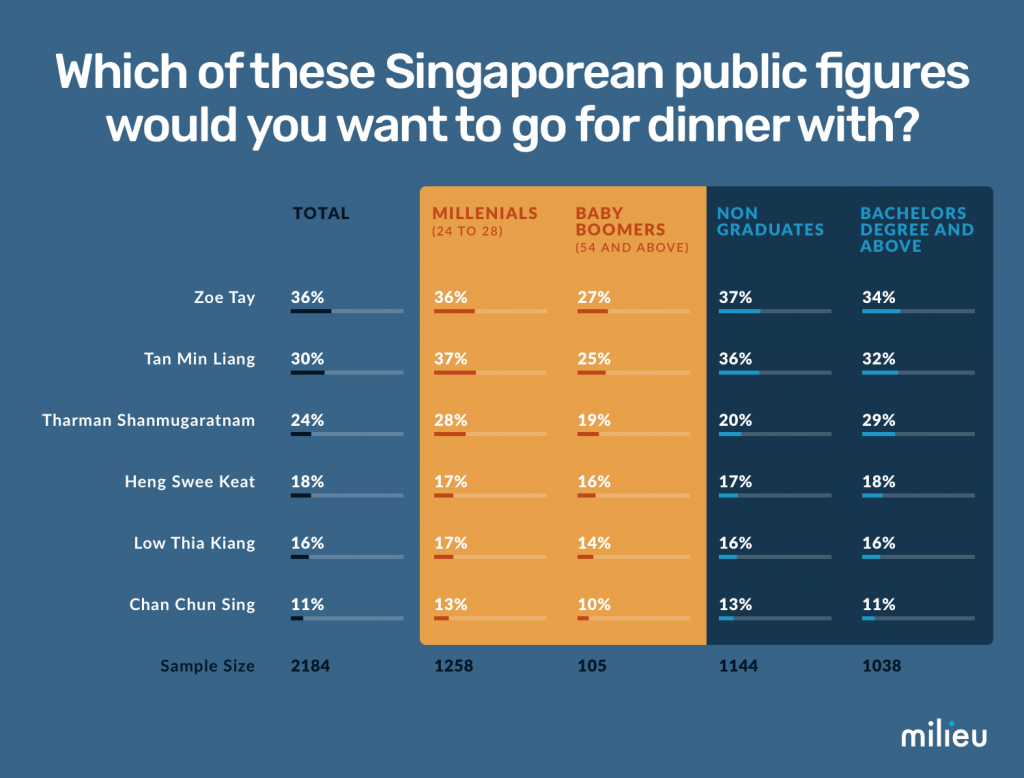
In essence, the results suggest that celebrity comes in different forms. In the same way that we celebrate Tharman for his wit and kindly facade, or Low Thia Khiang for his down-to-earth disposition, we celebrate Zoe Tay for being a symbol of what we think the Singaporean dream looks like when we achieve it.
In the same way that Zoe Tay’s stardom informs her desirability as a dinner companion, it’s no surprise that we want our politicians to be trustworthy and relatable, while exhibiting the traits of a good employer.
Even then, for all we know, Zoe Tay might turn out to be the most boring date, while Chan Chun Sing the most captivating.
But we will never know, because celebrity, like politics, is inextricably linked to optics. To be a good politician, one also needs to be popular.
As long as a politician appears to do what they are supposed to do, the Singaporean voter is mostly content. Our electorate’s concern towards domestic politics hardly extends beyond what is immediately apparent.
Notably, Heng Swee Keat has consistently ranked below figures such as Tharman. While both of them have contributed significantly to our nation’s progress, why is it that Mr Heng has never been able to reach Tharman’s heights of popularity?
In other words, there is what constitutes a popular politician, and what constitutes a good politician.
Milieu Insight is an independent, Singapore-based online market research company that measures public opinion through a mobile survey app, leveraging high quality data to provide insights for everyone.
What makes a perfect politician, and why? Write in to community@ricemedia.co.

